By Stephen Acott and Mikaela Turner
When George Floyd walked into a grocery store at 8pm on May 25 and asked for a packet of cigarettes, the only thing creating headlines around the world was COVID-19.
Twenty-seven minutes later, George Floyd was dead, and we all know how. Within 24 hours, another acronym was leading global news bulletins: BLM. Black Lives Matter.
This sentiment was not news to Christians, however. “Love thy neighbour” skips off the tongue as readily as “do to others as you would have them do to you”. Christianity espouses equity and the Uniting Church, by its very name, espouses inclusivity.
Or does it?
Just how inclusive are we?
Thirty five years ago, we boldly declared “we are a multicultural church”. In 2015, to mark the 30th anniversary of that statement we drew up another one reaffirming it. So by now, 2020, there should be no doubt. We. Are. A. Multicultural. Church.
And we are. But that’s missing the point. Just because we are multicultural, doesn’t mean we are inclusive. It doesn’t mean we are uniting. There is a difference.
Our Synod employs two coordinators to tackle this topic: one looks after intercultural community development and the other takes care of intercultural leadership development. On face value, it would be unfair to criticise the church, particularly this Synod, of not addressing the issue of inclusivity. Clearly it is trying.
Or is it?
When asked to describe his job, Intercultural Leadership Development Coordinator Rev Devanandan Anandarajan, says he’s there to, among other things, “resource the CALD (culturally and linguistically diverse) leadership in our Synod”.
“I work one on one with ministers from non-English backgrounds and encourage them to have the confidence to step up and offer their leadership, not just within their congregation, but within presbyteries and Synod,” Dev says.
So that’s the aim, but what’s the reality? And this is where we, as a church, as a Synod, have to take a step back, take a deep breath, and listen to some uncomfortable home truths.
Dev tries to explain the reality he witnesses by using an analogy of a meal. Or, in Biblical terms, a supper. He says the CALD community – which is a growing proportion of the church – is treated as if it is a guest.
“The key question,” he says, “is what is my place at the table? If I am a guest, I eat whatever the host has served. The food may not be to my taste, but because I’m the guest and you’re serving me, I eat it. However, if I’m there as an equal member, I would be invited to have a say. I can add my cuisine into that meal.”
Intercultural Community Development Coordinator Rev SweeAnn Koh is even more forthright. “Anglo people are making all the big decisions about the church,” he says.
“My favourite phrase is ‘we are a multicultural church, but with Anglo as the default setting’. Like a computer program, our default setting is Anglo. Unless we are prepared to design a different default setting, nothing changes.”
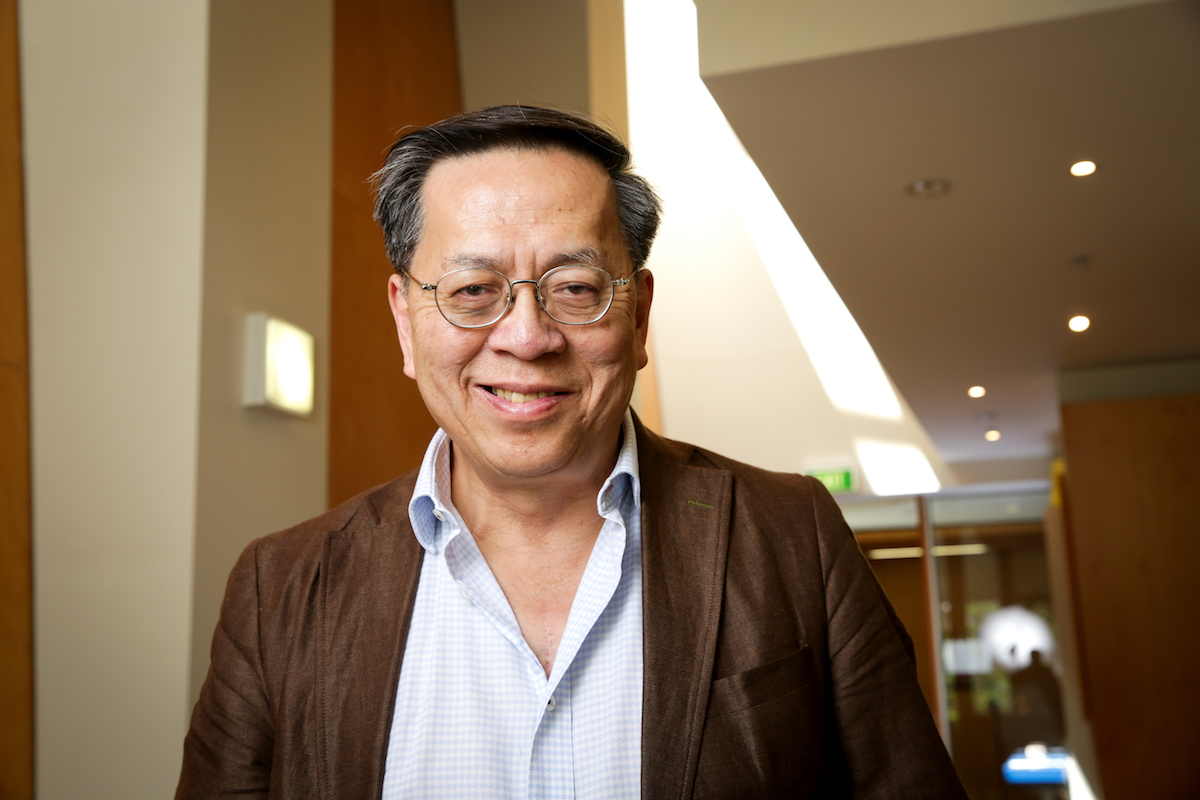
“I am sad because after nearly 30 years in this church, I am yet to witness a meaningful plan to address racism within our church.” – Rev SweeAnn Koh.
It’s difficult to mount a strong argument to counter what SweeAnn is saying. Taken as a whole, in the past 43 years the UCA has had just four people in senior leadership positions (presidents, moderators and general secretaries) who are from CALD backgrounds. If you were painting a picture of the UCA you’d want a lot of white paint.
Springvale Uniting Church minister Rev Paul Dau despairs when he’s told of that statistic, but he’s not surprised. He acknowledges the church is “welcoming”, but says it has a lot of work to do to become inclusive.
“When I came to Australia 17 years ago (from South Sudan), what attracted me to the UC is the hospitality and welcoming nature of this church,” he says.
“But if this other culture that we say we welcome and want to be part of this intercultural church are not part of the decision-making process they will always be lagging behind because decisions will be made on an assumption basis.
“What are we lacking that we can’t see people from diverse cultural backgrounds in top leadership?”
The issue of inclusiveness – genuine inclusiveness – is something Moderator Denise Liersch has given a lot of thought to. She acknowledges the Church’s failings in this area and is actively working to correct them, as are many others. When asked for an example, she offers the next Synod meeting.
“The Church thinks about having CALD members on committees a lot, but what often ends up happening is we call upon the same few people,” she says.
“So we have a few people on a whole heap of committees representing the CALD communities. But that’s a huge load for a small group of people to carry. And if the CALD rep is Korean, they can’t represent South Sudanese or Tongan communities. It’s almost like saying ‘we’ve got this all sorted, we just have to add one CALD perspective’.
“That shouldn’t be our starting point. Our starting point should be ‘together, with all of our cultural diversity, what are the ways that are going to make sure we can do things that include a huge cultural array.
“So, for the upcoming Synod Meeting, the business committee has met with the Synod intercultural forum to talk about this. Our worship committee is being led by Tupe Ioelu with the very clear focus that the worship committee he will pull together will be as inclusive and diverse as possible.”
Denise’s voice is refreshing in its honesty, enthusiasm and pragmatism. She acknowledges the Church suffers from “deep rooted attitudes” that has stifled meaningful diversity, but she can see a way forward. And it all begins with listening.
“There are attitudes we’ve grown up with that are so deep rooted we’ve never questioned them,” she says. “It takes a relationship with another person to discover our shared humanity and our difference in experience.
“When we’ve got trust between us and the capacity to be open and honest we can get to the point where we stop and listen to someone whose experiences are totally different to ours. And then we can shift and find new ways to do things together.”
Dev says listening is a good place to start, but it’s also important CALD voices are understood.
“An intercultural church is a place where those on the margins feel seen, valued, appreciated, understood, engaged and able to fully participate”, he says.
“When you talk about intercultural matters in the UC, people say it is important, but the problem is its only lip service. It is not done proactively and can be brushed away.”
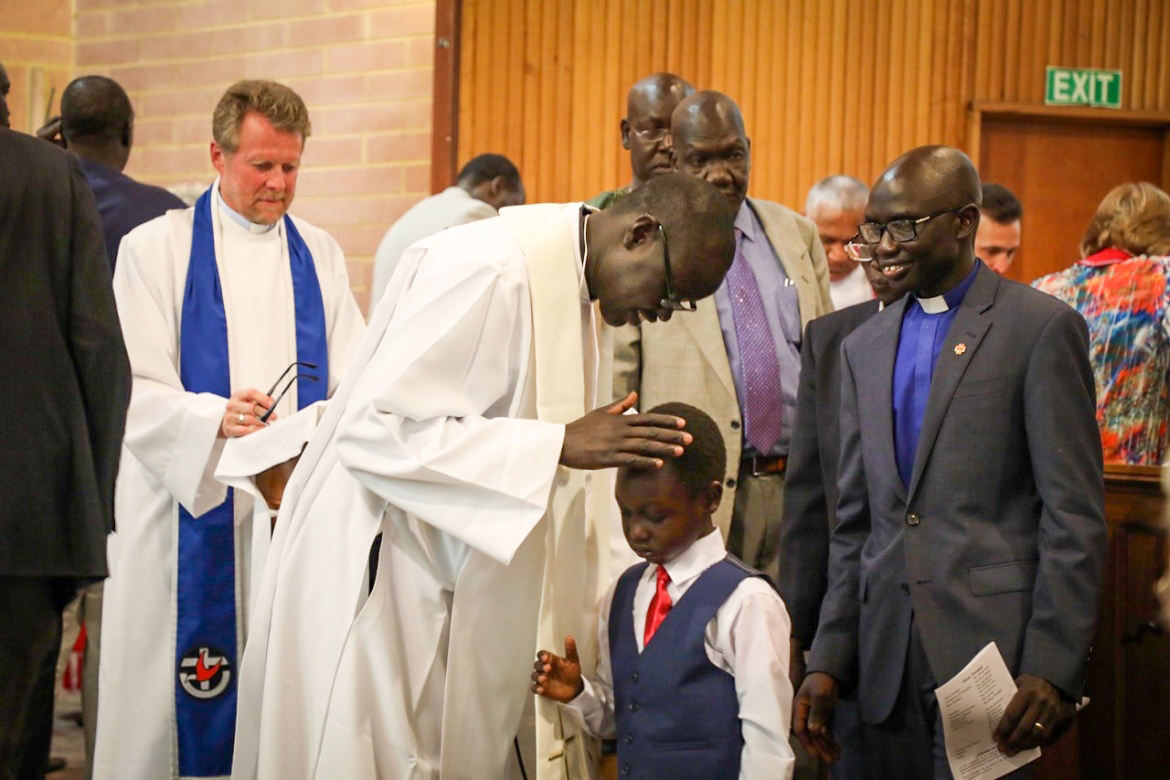
“What are we lacking that we can’t see people from diverse cultural backgrounds in top leadership?” – Rev Paul Dau. Photo by Ji Zhang
Lip service goes by many names, one of them being tokenism, and tokenism can be harder to detect, at least from the perpetrator’s perspective because it is often well-meaning. The end result is it becomes ingrained into structures and practices because the “victim” almost always doesn’t call it out.
Paul has a lived example. “It was at the 2011 Synod meeting,” he says. “I was asked to read a Bible passage in Dinka (his first language), but what was the point of letting me read in Dinka when I was the only Dinka speaker in the meeting?”
Dev says eradicating tokenism is as simple as one, two, three.
“What we need is participation and, in order to ensure participation, we need to get the numbers correct, balanced,” he says. “One is tokenism, two is representation, three is participation.”
Denise has another word for tokenism – “virtue signalling” – and it’s even more insidious because it champions the person as being morally good, suggesting they are doing enough and don’t need to do anything more.
“We’re great at making declarations, but tokenistic ones,” she says. “For example, we do Acknowledgement of Countries all the time, but it often doesn’t go further than that.
“And I felt uncomfortable in a strange way with a request to put the (anti-black deaths in custody and racism) ring around our Facebook picture. We were asked by Mark Kickett and Deidre Palmer together to show solidarity, to send messages of support to Congress, to join in the ‘Change the Record’ campaign and to call out racism. But if all we end up doing is to change our Facebook picture, and we feel that’s enough on its own, then it feels like virtue signalling – it’s talk, but it’s not necessarily doing anything different.
“I’ve heard from some people who feel it comes across as being almost like saying ‘see how good I am’ especially if there doesn’t seem to be any follow through beyond that. All the same, I think there’s a real movement of the Spirit sweeping through us at present, like a wind of change, inviting us to do more than that, and to join in.”
SweeAnn agrees. He thought the Facebook initiative was nothing more than symbolism. Empty gesturing. Trivial, even. And it did nothing meaningful to tackle racism.
“I understand the importance of symbolism, but the rings were just too easy,” he says. “And you change it back in two weeks, right? Unless you say to me, these are our concrete plans on how we are going to address racism, I don’t want to participate in symbolism.
“It’s there in Matthew 7:5. It says, ‘you hypocrite, first take the log out of your own eye, and then you will see clearly to take the speck out of your neighbour’s eye’.
“I think if the church doesn’t take the log (racism) out of its own eye, then to call out racism in our country lacks credibility and sounds empty. Racism is such an important issue to address in our country and church, so simply changing my Facebook profile frame seems to trivialise the seriousness of the issue.
“I am sad because after nearly 30 years in this church, I am yet to witness a meaningful plan to address racism within our church.”
When asked for his thoughts and perspective, Paul pauses, considers the gravity of what he is about to say, then offers this: “I name it, racism exists.”
By way of an example, Paul recalls an incident that occurred when he finished his placement at a country church in the Macedon Ranges. One elderly member thanked him for his service and praised him for how well he had done with their congregation. She told him the congregation had reservations about his placement when he first arrived. When Paul asked her why, she replied “because you are an African man”.
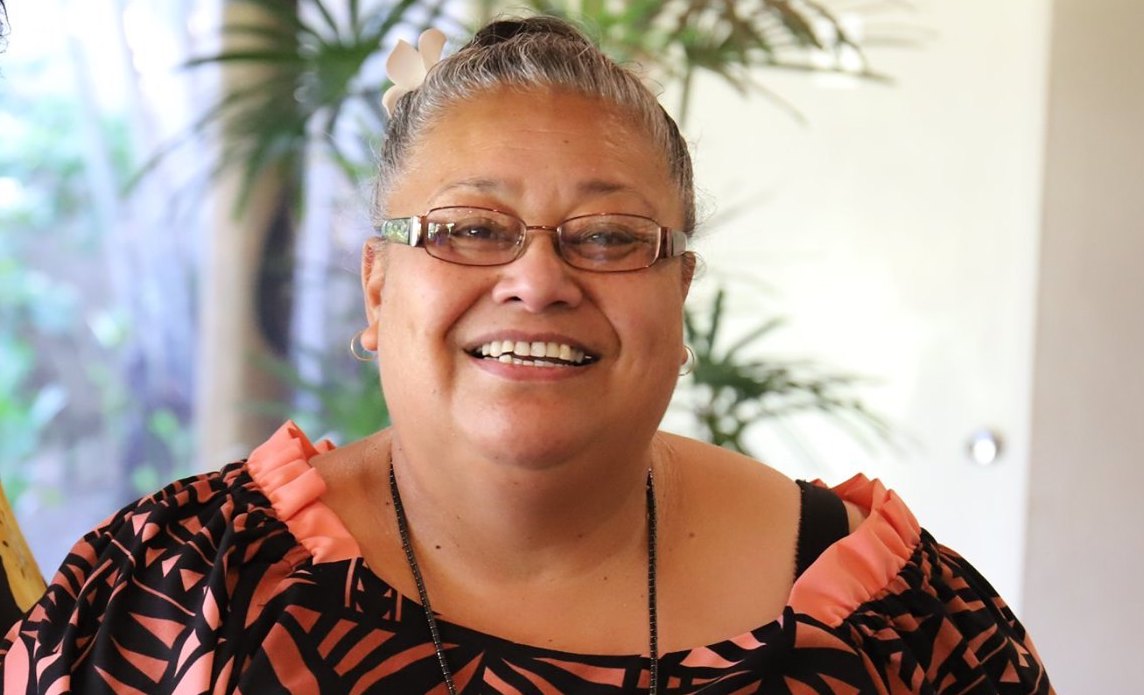
“Translation should cease to be an afterthought, but be an intentional matter of cause.” – Rev Juliette Mauai. Photo by Apenisa Seru.
That isn’t Paul’s only example. When he was in discussions with a church about serving there he was told his offer would not be accepted. Why? “Because that congregation had previously had problems with a CALD minister so it was assumed they’d also have problems with me,” Paul says. “But that’s rubbish. Just because a congregation has had issues with one CALD minister, doesn’t mean they will always have problems with every CALD person. That is systemic racism. It’s wrong and has to be addressed.”
President Deidre Palmer says she is “deeply saddened” to hear these stories. She says we are called as the Uniting Church to be “Christ-centred, spirit-led, intercultural and intergenerational in our ministry, leadership and expressions of faith”.
“All of us are created in God’s image and infinitely loved,” Deidre says. “In whatever form it takes, racism is unacceptable.”
The problem with issues as deeply ingrained and widespread as these – racism, tokenism, meaningful inclusivity – is where to start when trying to address them. As mentioned earlier, Denise says the business committee and others are trying to effect substantial change at the next Synod meeting.
One of the main barriers between constructive dialogue, however, is language. It’s so obvious, yet so problematic – particularly at Synod meetings. Think about it, the whole meeting is in English. There are no subtitles. If English is your second language, it stands to reason it would be hard to keep up with everything that is being said.
Rev Dr Jong Soo Park is a minister in the Banyule Network of Uniting Churches and Chair of Synod’s Intercultural Forum. He says it’s “unfair” for the Church is to consider itself intercultural and yet have all major decision-making processes done in English.
“There’s a big gap between my first and second language, Korean and English, so sometimes it’s very uncomfortable to make a statement in English, especially at Synod when lots of issues and agendas are going around,” he says. “It’s very hard to raise your voice.”
Jong Soo was recently invited to a business committee meeting where he shared his research findings on language inequality and white normativity in the UCA and presented on why having an all-English Synod meeting would be difficult and unwelcoming for its CALD audience. His presentation was so compelling, it was decided the next Synod meeting would include subtitles and an interpretation service for those who requested it.
“That’s a really good starting point,” he says. “It’s a welcoming gesture in accepting CALD people into the Synod meeting and I think it will make a huge difference.”
Rev Juliette Maua’i, minister at St Stephen’s UC Williamstown, says the Church won’t get anywhere in addressing racism unless it is prepared to have an open, honest, robust discussion where experiences are shared and uncomfortable truths are aired.
“If we can’t be honest within our own family, and I see the church as a family, then what happens when we’re supposed to be missional out beyond the borders of the church in society?” she asks.
“We are so afraid of having robust discussions that we become too sensitive and too politically correct to the point where we’re not getting to the nitty gritty of what it is to be intercultural. Ask what is racism and how has it affected you? I’ve lived with racism all my life. I think it’s liberating for all of us when we can speak honestly.”
Juliette also emphasises that building strong relationships is a two-way street; the onus doesn’t fall on Anglo people alone.
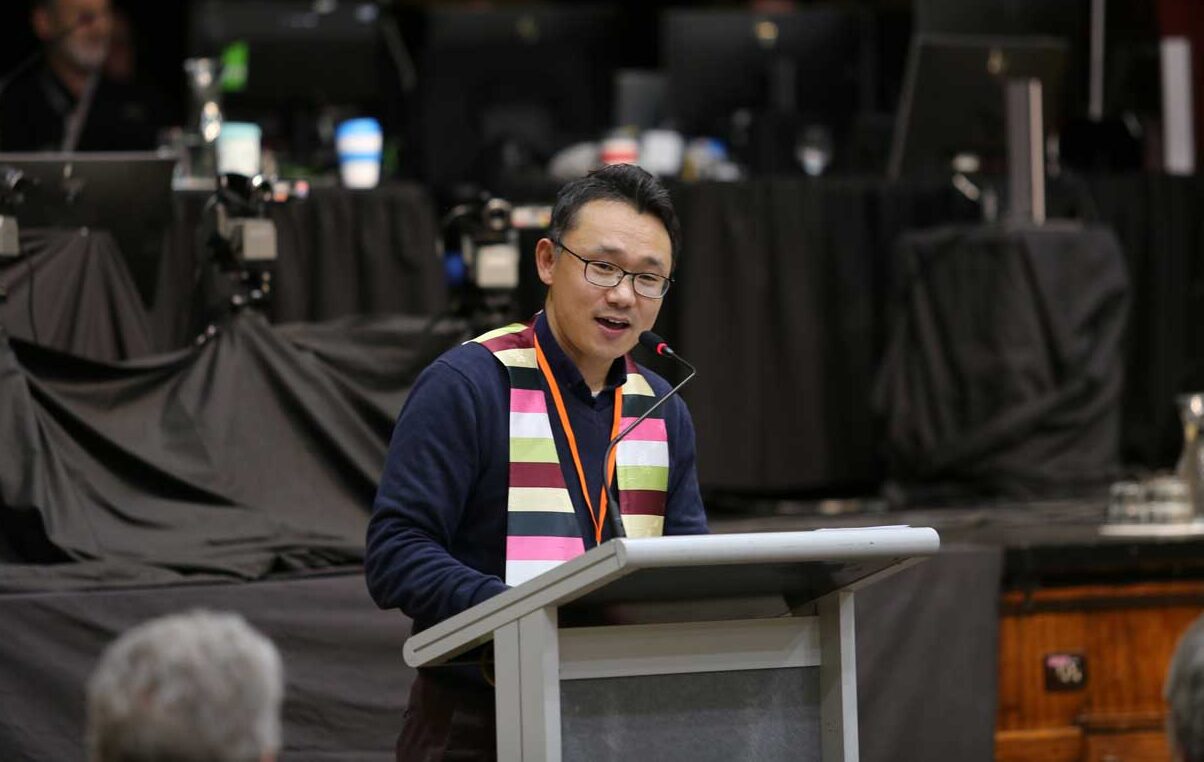
Rev Dr Jong Soo Park speaking at the 2019 Synod meeting.
“How can our Anglo brothers and sisters learn more of the way we think and engage if we don’t open up to those details in how and why we respond the way we do, or why we don’t put our hands up?,” she says.
“It’s important that we don’t ostracise our Anglo brothers and sisters to an extent where we shift any blame or frustration that it’s their fault that we’re not intercultural. I think we, as CALD people, need to recognise that because it can quickly become ‘them and us’. We have to continue to be engaged with one another to be an intercultural church.
“I get frustrated with our CALD people too, because sometimes they’re not aware that we are trying to advocate for their presence in the church. We encourage them to be more engaging because that’s what intercultural requires of us.”
SweeAnn says it’s imperative people who come from a CALD background speak up, share their observations and raise their concerns, particularly with regard to racism. This can be difficult to do for various cultural reasons, but “things don’t change when people stay quiet”.
“I encourage them all the time, if you experience racism in the church write it down,” he says. “If you don’t, the church thinks we are fine. They are afraid to offend people and afraid there will be a cost to speaking up. It’s easier to be quiet.”
Jong Soo agrees. “It’s very important that we encourage different opinions to be raised, but migrant ministers also have to try and raise their voices,” he says. “We need to reveal our voices more so we can allow the hidden parts and blind spots to be seen. Then we can try and deal with it.”
Our Synod has about 600 congregations, 22 of which you would classify as CALD. That’s an important statistic because CALD congregations are clearly in the minority. It’s also a misleading statistic, to some degree, because it doesn’t measure engagement. For example, the single biggest congregation in all of Victoria and Tasmania, by far, is the Korean Church of Melbourne, in Malvern. Each Sunday it has to squeeze about 650 people into its pews – and some of those people have driven an hour to be there.
Its minister, Rev Han Song, says its services are conducted in Korean and English, but its members are almost all Korean.
“For us, being intercultural is about helping our church members understand we need to live and work with other cultural groups,” he says.
“I would like to see more non-Koreans coming. I’d like to help our English-speaking congregation grow, not only attracting second-generation Koreans, but second-gen Asians and then hopefully people from the neighbourhood. I think we should be aiming to attract, or to invite, everyone across all cultures.”
Han believes the Church is getting better at embracing its culturally-diverse congregations. “We are really trying to understand and embrace and do this together,” he says.
Alison Overeem, Palawa woman and Leprena Centre Manager with the Uniting Aboriginal and Islander Christian Congress, agrees.
“I can feel the gentle whisper of change,” she says. “I believe and feel we are moving closer in a way which will celebrate and sustain how we connect our interwoven threads of culture. There is hope.”
Truth be told, there is more than hope and there is more than a gentle whisper. You have read it here in, ahem, black and white. There is a commitment, from the President and from the Moderator, that the Church is committed to being genuinely inclusive. It is listening and it is acknowledging past mistakes, but, most importantly, it is validating the collective voice of its CALD communities.
After all, black lives matter. And this is not just a uniting church, it is the uniting church.
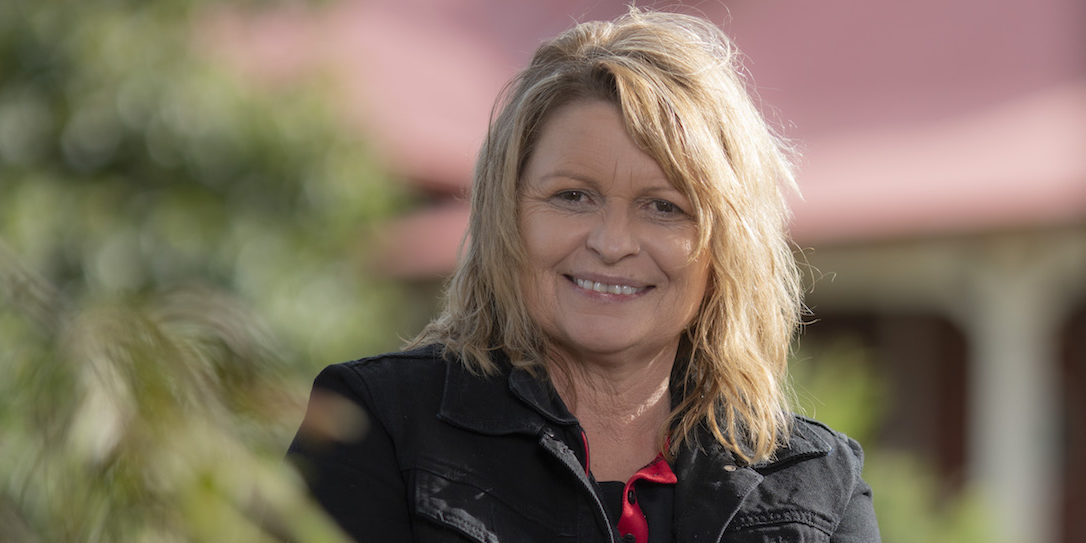
“I believe and feel we are moving closer in a way which will celebrate and sustain how we connect our interwoven threads of culture.” – Alison Overeem
Lost in Translation
“CALD” comprises four letters and “L” is in there for a reason. Linguistically, as in language, communication, understanding is a critical component. It’s also one that is often overlooked.
In these communities, English is mostly the second language and, the older demographic, the weaker the English literacy is.
The easiest way for the church to assist with this would be to offer translations or interpreting services, particularly with major publications or events. But these services come at a financial cost, some of them significant, and then there is also the question of how many languages are translated to.
Be that as it may, Rev Juliette Maua’i believes the translation of written materials within the church should be mandatory.
“Translation should cease to be an afterthought when we have materials going out to the wider church, but be an intentional matter of cause,” she says.
“Why can’t we equip our synod communications to be able to get it translated? It shouldn’t have to be done by CALD people who are already overloaded in our own ministry contexts.
“Don’t be driven by money. If we are disciples of Christ, if we are spirit led, then money shouldn’t dictate the means and resources we need.”
Rev Dr Jong Soo Park has spoken extensively to other CALD ministers about this issue and he says some people see language as a “gate keeper”.
“Their opinion is that those who can’t speak native English aren’t invited to leadership groups or to be involved in decision making,” he says. “We need to consider that element when it comes to our white-centred leadership.”
Rev SweeAnn Koh says without translations, the Church will never be fully multicultural.
“A multicultural church has to be a multilingual church,” he says. “We can’t be ‘multi’ in terms of culture or ethnicity and not recognise different languages.”
This article originally appeared in the August edition of Crosslight. To read the full magazine, click here.

